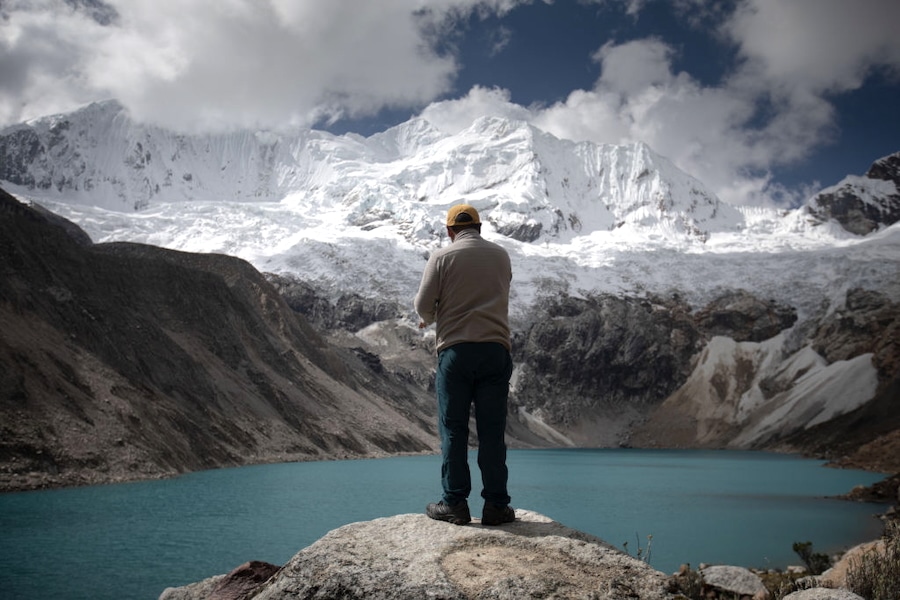This post was originally published on Eco Watch
A lawsuit filed by a Peruvian farmer against major German energy company RWE began on Monday.
The claim, which argues that global heating fueled by the firm’s greenhouse gas emissions poses a risk to the farmer’s home, could set a new precedent for climate litigation, reported The Associated Press.
“We have waited 10 years for this day, this decisive day,” said Saúl Luciano Lliuya, as supporters cheered outside the courthouse. “I’m very excited; I hope that everything goes well.”
The lawsuit, filed in the Higher Regional Court in Hamm, western Germany, makes the case that RWE’s historical emissions have contributed to the global warming that has accelerated glacial melt near Lliuya’s hometown of Huaraz. This has caused Lake Palcacocha to rise to dangerous levels, raising the risk of disastrous flooding in the community.
Standing in front of photographs of glaciers shaped like mountains, Lliuya said that the lakes, glaciers and mountains “give us water, give us life,” as Euronews reported.
“[T]he glaciers are melting, are disappearing bit by bit. Some lakes, lakes like Palcacocha – it’s a risk to me, to more than 50,000 people who live in the zone at risk,” Lliuya said.
RWE does not operate in Peru and denied legal responsibility, saying there are many contributors to the global problem of climate change.
Lliuya first challenged RWE following a Carbon Majors Study from 2013 that said the company was responsible for 0.5 percent of post-industrialization climate change.
Huaraz is asking the energy company to pay roughly 0.5 percent of how much it will cost — an estimated $18,562 — to protect Huaraz from imminent flood risk and the overflow from the nearby lake.
“What I am asking is for the company to take responsibility for part of the construction costs, such as a dike in this case,” Lliuya told reporters in early March, as reported by Euronews.
Lliuya originally filed a lawsuit against RWE that was dismissed by an Essen court. An appeal to a higher court in 2017 led to the current hearing.
Roda Verheyen, lead lawyer in the case, said she was “calm but hopeful,” The Associated Press reported.
“[T]here is no time to be lost, because the glaciers are melting every day,” Verheyen said.
RWE said it has complied with government greenhouse gas emissions guidelines and has a target of being carbon-neutral by 2040. However, its historical contribution to global heating has brought attention to corporate responsibility for climate change in addition to cross-border legal accountability.
RWE “is still one of the biggest emitters of CO2 in all of Europe,” Verheyen said. “This is only a very first step — a trampoline for further cases of this kind.”
According to nonprofit research group Zero Carbon Analytics, there are more than 40 ongoing climate damage cases worldwide.
Flood risk from Lake Palcacocha is a real concern for the residents of Huaraz, reported NPR. A 1970 earthquake in the valley triggered a deadly landslide that took the lives of approximately 25,000 people.
In addition to the risk of flash flooding, avalanches and landslides, glacial melt is also interfering with the availability of drinking water for many communities. As ice sheets melt away, local streams have become toxic and discolored from recently exposed rocks containing heavy metals.
The region’s seasons are also affected, hindering agriculture.
“It is scary, the risk from climate change. For example, it has been raining. Even the rivers that pass through the city have risen,” Lliuya told NPR. “There is a lot of fear and the lake’s levels have risen. People are very worried.”
The case is being litigated near the head offices of RWE in Hamm and is expected to last several weeks.
“We want Saúl and the people of Huaraz to live in safety. No one should live in fear of losing their home due to the climate crisis. Polluters have to step up and pay the true price of their business model,” said Francesca Mascha Klein, a Germanwatch lawyer who is working with Lliuya on the case, as NPR reported.
The post Farmer in Peru Takes Major Germany Energy Firm to Court Over Emissions appeared first on EcoWatch.





0 Comments